
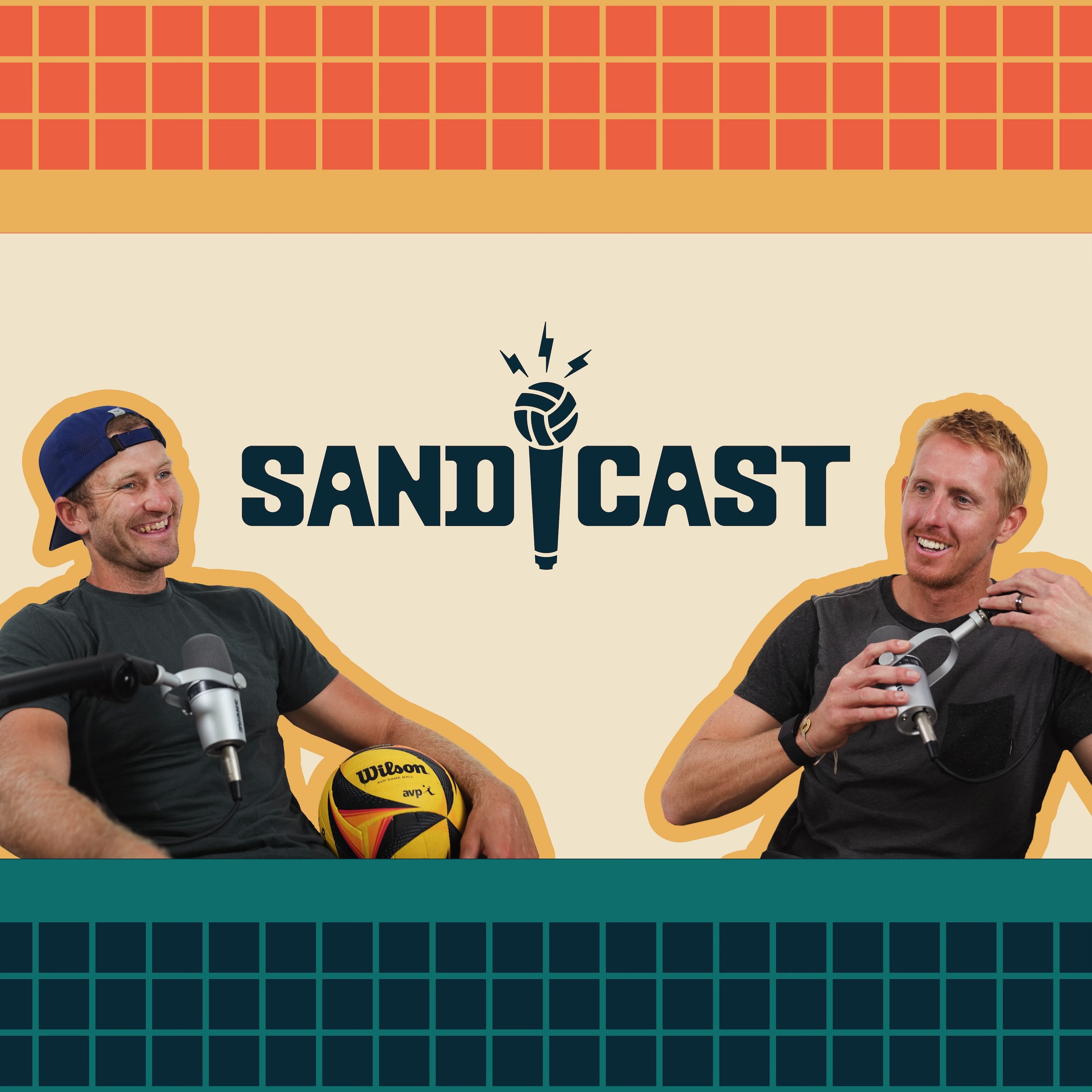
1.1M
Downloads
469
Episodes
SANDCAST is the first and leading beach volleyball podcast in the world. Hosts Tri Bourne and Travis Mewhirter take listeners into the world of the AVP, Volleyball World Beach Pro Tour and any other professional beach volleyball outlets, digging deep into the lives of the players both on and off the court as well as all of the top influencers in the game.
Episodes
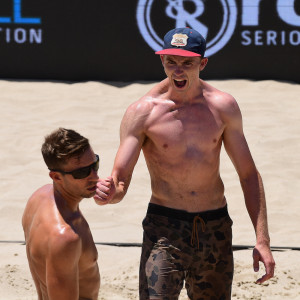
Wednesday Jul 31, 2019
Adam Roberts and Andy Benesh: From qualifier struggles to career finishes
Wednesday Jul 31, 2019
Wednesday Jul 31, 2019
The first notes on the Book of Andy Benesh came a little less than a year ago, about a six-hour drive north of Hermosa Beach. Adam Roberts was there to watch Benesh’s second-round match. Playing in just his second AVP qualifier, with little points to his name, Benesh came in as the 33 seed, meaning, after a pigtail round, he, with Cole Fiers, had top-seeded Myles Muagututia and Kyle Friend.
“I saw him serve a ball, get to the net, get four blocks in a row, get an ace, and I was like ‘Who is this kid? Let’s see if he can set,’” Adam Roberts, Benesh’s current partner, said on SANDCAST: Beach Volleyball with Tri Bourne and Travis Mewhirter. “Standard big guy stuff, right? They serve Cole and he puts up a juicy set and I’m like ‘Man! What is his name? What is his number? I’m gonna tuck that one away.’”
While Roberts had it tucked away, Benesh quietly made a few main draws. He wound up qualifying in San Francisco, upsetting Friend and Muagututia, 24-22, 21-17, and winning his next two matches. Then he and Fiers did it again in Hermosa.
It was an auspicious start for Benesh’s beach career, one that really only began in earnest a few months prior to San Francisco. He had been an indoor kid, for the most part, growing up. Raised in Palos Verdes, he was named First Team All-American, put on the VolleyballMag.com Fab 50 list, All-Area, All-League, All-Everything. Those accolades earned him a spot as a middle at USC, where he started all 26 matches as a freshman, falling just shy of the Trojan hitting percentage record.
So went the next three years at USC, where he continued to excel, eventually being named captain as a senior. But the only beach experience he had was messing around on the fours courts at 16th street.
Which brings us back to Roberts’ key question for all big men: Could the kid set?
Prior to AVP Huntington, Roberts set up a four-team practice, Benesh being one of the teams. There it was confirmed: Benesh could indeed put up a set, and after both failed to qualify in Huntington, both were looking for partners in Austin.
Roberts turned back the clock to that day in San Francisco.
Yes, Benesh would be quite the option.
Their first two tournaments, though, they fell short. A few quirky plays in the third set of the final round of the AVP Austin qualifier kept them out of main draw. Then came a first-round exit in New York and all of a sudden doubt began creeping in.
“You look at it, and it’s ‘Are we a good team or are we not?’ We’re kinda looking at it like ‘Maybe we’re not that good’ but I was thinking ‘Man, I really think we’re a good team,’” Roberts said. “Even if you look at the results, losing the round to get in, lose first round, lose first round, maybe they’re not that good, but I just kept thinking we really have something special here. To me, it doesn’t make sense when guys make lateral moves mid-season. I just kept thinking: I think we’re a good team, I think we’re a good team.”
The past few months, they’ve proved as much. They flew from New York and directly into an AVP Next Gold Series in Colorado, winning the tournament and, subsequently, a bid into the Manhattan Beach Open main draw.
In Hermosa, they qualified for their first main draw, marking Benesh’s first in a year and Roberts’ first since Chicago of 2017 with – here’s a good beach volleyball trivia tidbit – Mark Burik.
They were ecstatic, to be sure. But not satisfied. Not yet.
“I texted Adam Thursday night and said ‘We’re not done yet,’” Benesh said. “I’m not just here to go 0-2 in the main draw. I’m trying to win some matches, see if we can compete at that level.”
Oh, they competed all right. They came out and won their first main draw match 21-17, 21-11, setting up a match with fourth-seeded Billy Allen and Stafford Slick. And on a packed stadium court, they delivered the first major upset of the tournament, 23-21, 18-21, 15-11. A day later, they’d deliver another, eliminating seventh-seeded Chase Frishman and Avery Drost, 15-21, 21-18, 15-13.
“Obviously coming out of the qualifier we don’t have that opportunity every tournament,” Benesh said of upsetting main draw teams. “So when you do you want to take advantage of it. I don’t think there was a team in the draw that we were intimidated by.”
They’ll be back in the main draw again, in Manhattan Beach, now with a seventh-place finish under their belt, and a God-blessed day of rest prior to the tournament.
“It’s nice. It’s very nice,” Roberts said. “It kind of gives us a chance to really focus on a main draw. That extra day of rest is going to be very useful.”
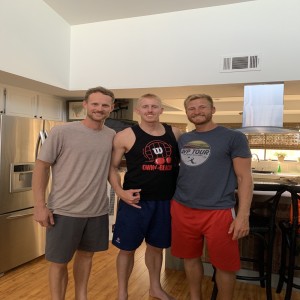
Wednesday Jul 24, 2019
It's a good year to be Chaim Schalk -- American Chaim Schalk
Wednesday Jul 24, 2019
Wednesday Jul 24, 2019
It was an otherwise innocuous Monday when the Canadian beach volleyball community reached and unleashed its peak fury which, because it’s Canada, really wasn’t much fury at all. Tri Bourne had put up a picture of Chaim Schalk.
No, no. Not just Chaim Schalk.
“American Chaim Schalk,” Bourne put on Instagram.
For nearly a decade, Schalk had represented Canada on the beach. He had been an Olympian for Canada on the beach. He had made international podiums for Canada on the beach. Raised in Red Deer, Alberta, with a habit of punctuating sentences with ‘eh?’ and a humility and affability that you just don’t find much in Southern California, Schalk was, by all accounts, Canadian to the core.
So what was he doing, on Monday, May 6, wearing a USA Volleyball shirt, taking pictures, doing promos, looking like, well, “American Chaim Schalk”?
Just running out the clock until his international volleyball purgatory is over.
“I got a lot of messages on that,” Schalk said of Bourne’s post of Schalk at USA Volleyball’s Media Day. “A lot of people still didn’t know. They were like ‘What does this mean? Why do you have a USA shirt on? This is messed up!’”
At the end of the 2017 FIVB season, Schalk announced that he would be making the transfer from Canada to the United States, competing for the Yanks instead of the Leafs. It meant a hefty fee and a two-year hiatus on the world tour, but it also meant access to USAV’s resources, the ability to live and compete and train full-time in Southern California, the opportunity to represent arguably the biggest powerhouse beach volleyball nation on the planet.
And, while nobody wants to lose two years of their international careers, in what could be their prime, the timing was perfect for Schalk. In May, Schalk’s wife, Lane Carico, also a professional beach player, gave birth to their daughter, Koa. With Schalk unable to compete around the globe, he’s been able to spend time at home, helping with Carico, helping with Koa, witnessing the miraculous growth that is the first few months of a child’s life.
“It’s been a blur the past couple months with the baby, just helping out as much as I can. It’s been so nice to be home and help out with Lane and it’s been so nice with the AVPs because I take off Thursday and then I’ll be back Sunday night,” Schalk said on SANDCAST: Beach Volleyball with Tri Bourne and Travis Mewhirter. “It’s been a perfect time to have a kid because I haven’t felt like I needed to be away and if I was away for a couple weeks that would be a little tougher for right now.”
This is not to say that Schalk doesn’t get antsy. He watched World Championships in Hamburg. He watched the Gstaad Major. They’re his two favorite stops on tour. He saw the Instagram posts, the ones athletes just cannot help but putting up – cups of coffee in the mountains, the stunning green of Gstaad, the mountain biking, the crowds, the stadiums.
“Everyone just has to do their water photo and the morning coffee, ‘Not a bad place to wake up to,’” Schalk said, shaking his head. “C’mon guys! That makes me itch a little bit.”
In November, he can alas scratch that itch, getting back out onto the world tour, representing a different set of colors, a different flag, a different federation. So, Canada beach volleyball nation, soon enough, you’ll have to accept this simple reality.
He’s not just Chaim Schalk anymore. He’s American Chaim Schalk.
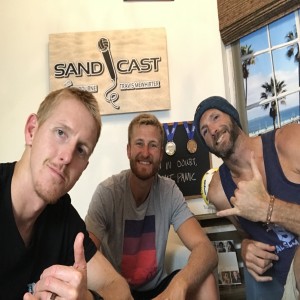
Wednesday Jul 17, 2019
The next chapter of Ryan Doherty's career begins in Hermosa Beach
Wednesday Jul 17, 2019
Wednesday Jul 17, 2019
The most difficult transition of Ryan Doherty’s new partnership, from John Hyden to Miles Evans, might not be the difference in playing style or personality or skill level or experience or energy level or setting preferences or serving or any of the other obvious tangibles that can make partner switching a sometimes-difficult ordeal.
It might just be the high five.
We joke, kind of, sort of. Because we’re also serious, kind of, sort of.
“Our first couple times practicing, Miles kept coming in for the high five, and Hyden – we never high-fived,” Doherty said on SANDCAST: Beach Volleyball with Tri Bourne and Travis Mewhirter. “Miles would get an ace and I’d point and he’d be right behind me saying ‘Yeah! Let’s do this!’
“This is 9 a.m. on a Tuesday morning so I gotta get used to this puppy dog energy. I’m looking forward to it.”
This is the next chapter of Ryan Doherty’s career, one that is nominated for the unofficial award of Most Likely to be Made Into a Movie. Since moving on from a professional baseball career that was beginning to flat line and making the cross-country trek to California, Doherty’s path was been wonderfully circuitous and, by all means, remarkably successful. His list of partners, despite not having a volleyball background, aside from pickup games against high schoolers in South Carolina and a few Great American Volleyball events in New Jersey, is a who’s who of the best American defenders of this generation.
“I have been lucky enough to play with a murderer’s row of partners, some of the best defenders in the U.S,” Doherty said. “It started with Casey Patterson, Todd Rogers, Nick Lucena, Johnny Mayer, John Hyden, back to John Mayer, Billy Allen, and then John Hyden. I was always the younger one. As someone who tries to teach and I think I know a little bit about the game I think it might be fun to help out Miles a little bit, see if I can maybe guide him a little bit.”
That group has combined for more than 150 professional wins and three Olympic appearances, five if you include Hyden’s two Olympics with the indoor national team in 1996 and 2000. That level was never Doherty’s goal. He’s not much of a goal guy. He’s always, simply, wanted to become the best beach volleyball player he can be, a path on which he’s still traveling. Now he’s playing a different role, from student and sponge, soaking up the knowledge of those who have been able to dispense it, to doing the same for the next generation of defenders, one who has a legitimate shot at making that Olympic level in the years to come.
“He could easily move into that great category,” Bourne said, a sentiment with which Doherty agreed.
“I’ve seen Miles play for a couple years,” Doherty said. “He’s getting better and better and I don’t know how he’s going to try to turn that corner in terms of being a good player into a great one, one of the top players in the country. His skills are there, it’s just the experience, the comfort of being at the top level. I think with his natural abilities being really physical and my calm demeanor being able to bring him down when he gets a little too ramped up, I think that might help us out a bit.”
The change, in general, will likely help them both. Evans hasn’t competed in an AVP main draw since Huntington of 2016. Now, he’s straight into main with Doherty. Doherty, meanwhile, admitted this year hasn’t been his finest. Sometimes a change, not begat out of ill will but out of a need for something different, is exactly the thing.
“I haven’t been playing at a very high level, so it’s one of those things where if you’re not playing really well and you’re kinda miserable, what’s the point?” Doherty said. “Let’s try to do something different, mix it up. I have no ill feelings. I hope [Hyden] keeps dominating till he’s 50 years old. I figured I’d try something new.”
And so, in Evans, he is. And the next chapter of the fascinating book that is the life of Ryan Doherty begins.
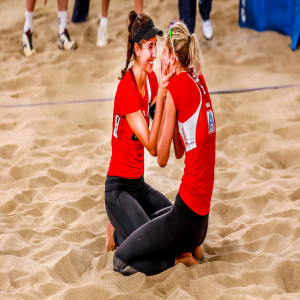
Wednesday Jul 10, 2019
Melissa Humana-Paredes and Sarah Pavan: A team of Canadian firsts
Wednesday Jul 10, 2019
Wednesday Jul 10, 2019
It wasn’t exactly an audacious start, was it? September 12, 2016. The first match of Melissa Humana-Paredes’ and Sarah Pavan’s partnership: A country quota against Brandie Wilkerson and – who else? – Pavan’s former partner, Heather Bansley, in Toronto, no less, the training center for the Canadian national team, where Pavan has played something of a revolutionary role.
She did not, however, play that role on September 12 of 2016. On that day, her and Humana-Paredes, an affable young defender of 23 years at the time, lost, 21-23, 13-21.
They wondered, almost incredulously, if they could feel such an emotion at the time, why a reporter had reminded them of that loss. He had reminded them in the moments after they had won the World Championship. It was Canada’s first. A momentous achievement not just for two individuals carving out history in a sport rich in it, but for a nation that is rapidly creating a foothold in a space traditionally dominated by countries south of the Canadian border.
“Why would you remind us of that?” they wondered, simultaneously.
Because it makes the narrative that much sweeter, the process that much more real. There is no relating to a story with a smooth beginning, steep curve in the middle and a World Championship at the end. They know it, too, even if they didn’t want to relive that country quota loss quite so soon after reaching a new pinnacle for Canadian beach volleyball.
“Every failure,” Pavan said, “has led to this moment. Nobody sees the tough moments.”
What most see is that Humana-Paredes and Pavan are currently doing for Canada, on their on relative scale, what Kerri Walsh Jennings and Misty May Treanor once did for the United States: They’re writing their own country’s history.
It was at Gstaad, where the best players in the world are currently competing, a year ago where Pavan and Humana-Paredes claimed Canada’s first major title. Didn’t even lose a match, those Canadians, dethroning the countries that laid the foundation of beach volleyball’s traditional powers that be: 21-15, 21-15 over the United States, 14-21, 21-12, 15-13 over Brazil, 21-17, 12-21, 17-15 over Germany. Only months before that, they had become the first Canadian team to win a Commonwealth Games.
It was last June when Humana-Paredes said, on SANDCAST: Beach Volleyball with Tri Bourne and Travis Mewhirter, that “we have so much more that we need to improve on and that we can improve on and I think our potential – it seems limitless right now."
Prophetic words. It hasn’t all been pretty, and they knew it wouldn’t. Pavan knew she was taking a chance on Humana-Paredes then, who had been relatively unproven at the time. She knew the potential upside, an upside that is now paying dividends in the form of history, of major titles, of World Championships.
“It happened much quicker than either of us expected,” Pavan said on that episode a year ago, and those same words ring true a year later. “It’s nice to see the grit and the fire of not being satisfied with making one semifinal or one podium or whatever.”
And so they’ll continue to remain unsatisfied. So long as reporters continue to remind them of their humble beginnings, if not only to show them just how far they’ve come.
“The things we have overcome this week, last week, this year, in the last two years, three years and now we’re world champions,” Humana-Paredes said. “I have no words.”
No need for words when you have history.

Wednesday Jul 03, 2019
Tim Bomgren: The humblest grinder on the AVP Tour
Wednesday Jul 03, 2019
Wednesday Jul 03, 2019
It was the running joke in the player’s tent of AVP New York: Nobody really wanted to play any of the teams on the bracket. Of the seven teams Tim Bomgren would end up playing in New York, five included Olympians, and the other two were teams currently pushing for Tokyo 2020.
“I hadn’t thought of it like that,” Bomgren said on SANDCAST: Beach Volleyball with Tri Bourne and Travis Mewhirter. “You look at the bracket and you’re like ‘Ok, I’m not really happy about playing any of these teams.’ It’s just one of those.”
Bomgren and his new partner, Troy Field, the social media maven with the big jumps and the pink hat, can officially be labeled as one of those teams nobody would particularly enjoy playing, in large part because of talent, but also because balls that should go down just don’t, as if they’ve got the remote control to gravity and have found a way to keep Wilson off the sand for just a tad longer.
“Team never say die,” Camryn Irwin labeled them on the Amazon Prime livestream of New York, where Field and Bomgren produced highlights of viral potential like most teams produce regular side outs.
“We both know we’re going to be as scrappy as we possibly can and we’re just going to work our tails off,” Bomgren said. “We might not be the smoothest side out players, we might not be the best setters, we might not be the best servers, but we’re going to scratch and claw our way to get whatever points we can. So far it’s worked out pretty well.”
Don’t listen to him. Not even for a second. That’s the Minnesotan in him. By now you know Bomgren’s story: Minnesota born and raised, playing every sport there is to play. Picked up volleyball in college but was so darn athletic it didn’t matter he had a late start. Not all that much different from his partner, really. Field, too, had a late introduction to the sport and initially, sure, but by now both are deeply skilled enough that it’s the combination of a scrappiness begat from an initial need for it blended with a bona fide beach skill set that makes them one of the most exciting teams to watch. And one of the most consistently successful teams on tour.
Without a single competitive match under their belt, they made the semifinals in Huntington Beach. They won their first match over Sean Rosenthal and Ricardo Santos, two Mount Rushmore-worthy candidates for their respective countries. They beat champs in Ed Ratledge and Rafu Rodriguez, and future Seattle winners Jeremy Casebeer and Chaim Schalk.
Any thoughts of it being a honeymoon phase were quickly silenced when they did the same thing the following tournament in Austin, then slugged their way through the gauntlet of New York, where they made their first final, falling to Phil Dalhausser and Nick Lucena but not before gifting the Amazon Prime staff a coterie of highlights for the internet to enjoy.
“Both him and I just love the game and love the competition,” Bomgren said. “Getting along with your partner and having fun with your partner is so key. I hope you guys can tell it, but Troy and I are having an absolute blast out there. It’s making some of our success feel that much easier because we’re having so much fun.”
He still feels like an underdog, Bomgren. Partly because he’s still in Minnesota. Partly because, I mean, what the hell, he’s not shooting for the Olympics. Yet here he is anyway, grinding through matches against the world’s elite. He acknowledges that he knows he belongs, that it doesn’t really matter to him if he has an armada of coaches pounding balls at him five days a week. He just doesn’t need that many reps. And besides, he’s got his son, Brody, an affable two-year-old who wants nothing more than to play volley in the basement with dad after work.
Not the most traditional program, but when has Bomgren’s success been traditional, anyway?
“One of the things that’s eye-opening is when you finally see the success,” he said. “Getting that success is never easy. You have to work your tail off, and that’s kind of my game. I’m not the best passer, not the best setter, not the best hitter, but controlling the things I can control has been huge for me and I’m doing that better than I have before and compiling those things together has allowed me to play at the top level and make it to where I want to be. I’m ready to really play at the top level.”
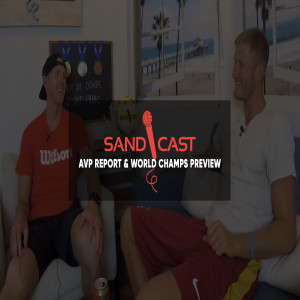
Wednesday Jun 26, 2019
AVP mid-season awards, World Champs preview
Wednesday Jun 26, 2019
Wednesday Jun 26, 2019
With one, final Jeremy Casebeer – or Uncle Jer Bear, as he was known at Lake Sammamish – swing in Seattle, the AVP officially reached the midpoint of the 2019 season. It has, by any measure, been a rollicking success. Every event has been home to packed stadiums and sold out VIP areas and flowing beer gardens.
Most importantly, it’s been home to excellent beach volleyball.
Upsets have become the norm this season, a sign that the field, on both the men’s and the women’s side, is deepening. Qualifier teams have upset the one seed in the men and the women. Three different teams have won a men’s title and three different have won a women’s title. Two of those victors on the women’s end – Karissa Cook and Jace Pardon, Kelley Larsen and Emily Stockman – have been new winners, while one, Uncle Jer Bear and Chaim Schalk, has been a first-timer for the men.
It’s made for a fun season to watch for fans, one in which new faces are emerging, older ones are being pushed, and people are coming out in droves to see it.
On SANDCAST: Beach Volleyball with Tri Bourne and Travis Mewhirter, the hosts break down the mid-season AVP awards.
MVP
Men’s: Taylor Crabb
Few have ever looked so indifferent when being introduced in an AVP final. Yet there Taylor Crabb sits, legs crossed, paying attention to seemingly everything but his name being called to play an AVP final. Such is the state of mind when you expect to be there, and it’s easy to see why Crabb does, indeed, expect to be there. Crabb and Gibb won the first two events of the season, in Huntington Beach and Austin, making it three straight when dating it back to Chicago of 2018. In the past two seasons, they’ve made eight finals in 10 events, not including the Hawai’i Invitational. Much of this is due, yes, to Gibb, but Crabb is playing at a level unmatchedon the AVP this season.
In the running: Phil Dalhausser, Nick Lucena, Jake Gibb, Jeremy Casebeer
Women’s: April Ross
In discussing Ross, Bourne wondered when the last time the 37-year-old wasn’t only the best player in the country, but in the world. She has played two AVPs this season and won both. Her and Alix Klineman have played six FIVBs and won two. As with Crabb, much of the credit goes to Klineman’s 6-foot-4 presence at the net, but Ross is the engine, fueled by a serve that has earned her FIVB’s Best Server five times since 2013, and an all-around game that has awarded her four AVP MVP’s since the same year.
In the running: Alix Kineman, Sarah Sponcil, Betsi Flint, Emily Day
Rookie of the Year
Men’s: Paul Lotman
Of the many skills, both tangible and not, you cannot teach in beach volleyball, one is this: Being an Olympian. Lotman has that distinction, and it’s beginning to show, as his indoor game translates to the beach. A year ago, Lotman showed glimpses of his beach potential in a titanic serve and the physicality that earned him a spot on the 2012 Olympic team. But there were a few skills that needed grooming.
Consider them groomed.
Lotman and Gabe Ospina have qualified for three straight events, all small draws, and became just the second 16-seed to beat a one in AVP history, topping Gibb and Crabb in Austin. They don’t seem to be slowing, either. Now, with enough points to likely get them straight into Hermosa and Manhattan, they won’t have qualifier legs, but fresh ones prepared to make a move deeper into main.
In the running: Gabe Ospina, Kyle Friend, David Lee
Women’s: Terese Cannon
Truth be told, I don’t know whether Cannon is still, technically, considered a rookie, because she’s made a handful of main draws prior to this season. But if she’s eligible, Cannon has a runaway case for Rookie of the Year. She took third in Austin – she skipped Huntington Beach for NCAA Championships – to begin the year and has taken a ninth and seventh since. Her and Irene Pollock have enough points where they’ll be in main draw for the remainder of the year, making Cannon the early, and heavy, favorite to win.
In the running: Kim Hildreth, Sarah Schermerhorn, Falyn Fonoimoana, Emily Hartong
Breakthrough Athlete
Men’s: Troy Field
Field’s rise on the AVP, both as a player and personality, has been meteoric. He has gone, in the span of two years, as that qualifier guy wearing a pink hat who could jump really high to a bona fide contender to winning AVPs. In four events this season, he and Tim Bomgren have made three Sundays, including a final, Field’s first, in New York City. With Hermosa and Manhattan expected to be a tad watered down, with teams skipping for Olympic qualifiers, odds are that Field and Bomgren will be back in the finals soon enough.
In the running: Tim Bomgren, Chase Budinger, Jeremy Casebeer, Chaim Schalk
Women’s: Jace Pardon
A few weeks prior to Huntington Beach, Pardon wasn’t sure who she was going to play with. She had popped around with a few different partners in 2018, never really finding a consistent rhythm with any, one player. Then Karissa Cook freed up, and the rest, you could say, is history in the making.
They took a fifth in Huntington, and then worked their way through the contender’s bracket in Austin to claim their first AVP titles. Far from one-hit wonders, they made another quarterfinal in New York and then a second Sunday in Seattle.
In the running: Karissa Cook, Emily Stockman, Sarah Sponcil, Irene Pollock
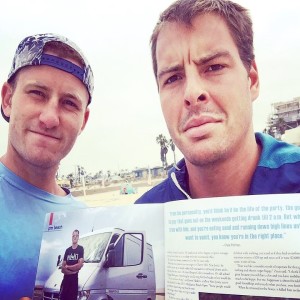
Wednesday Jun 19, 2019
Remembering Eric Zaun aka Danny Fahrenheit aka Cookie Robinson aka Midnight Verde
Wednesday Jun 19, 2019
Wednesday Jun 19, 2019
I’ve always been one for mythology. I loved reading the tales of Zeus and Poseidon, Hades and Hermes, Athena and even those of the Norse orient, Thor and Loki and Odin. One of my favorites has always been the myth of the Phoenix, that stunning bird that never really dies. It burns, sometimes spectacularly in in a show of flames and combustion, sometimes in a simple and subtle decomposition.
Either way, the end result is invariable: From its own ashes, it rises again.
I think that’s beautiful.
And so the beach volleyball world must do the same.
This past week we, as a whole, as a single community with a single, beating heart, have been reduced to ashes. The death of Eric Zaun has impacted the entirety of the AVP and those well beyond.
In Virginia Beach, there was a moment of silence before an AVP Next Gold Series. Folks from the snow volleyball world expressed their condolences. The FIVB, too. The Pottstown Rumble, site of one of Zaun’s most famous and epic and wonderful temper tantrums, will honor the kid who once took a red-eye after Seattle to play on zero sleep but put down no small amount of cash on a match anyway.
Everywhere you look, the beach world is rising. It is rising in its own unique way. Donald Sun reached out to every player on the AVP, expressing his condolences, encouraging players to reach out of there was anything the AVP can do to help its own.
To help them rise.
We at SANDCAST are doing the same. We’re replaying Zaun’s episode this week. Maybe it will help some. Maybe it won’t. The hope is that it can provide, if just for one, that first stirring amid the ashes, that maybe it can begin to lay the foundation to the first step in recovering. Not moving on, no. But moving up. Onward.
Rising.
This is not a good thing that has happened but good will come of this. I am sure of it. I am sure of it because I’ve already seen it. I’ve seen it in such abundance in only a week that it’s a wonder, should this spirit, this Zaunian spirit of an unbridled zest for life and fun and mischief carry on, what incredible things could come of this.
Already, Ed Ratledge is pondering how the beach community can make an award, the Eric Zaun Grinder Award. Something to do with the van, Zaun’s hysterical but wonderful abode for a few years. He doesn’t know just yet. He doesn’t have to.
Point it: It will be something good. Something new.
That, above all, is what I love so much about the myth of the Phoenix. It’s never created entirely new, but from the ashes of its predecessor. It never loses pieces of itself but instead uses them to grow into something brighter than its previous self.
And so, at AVP Seattle, at Pottstown, the beach volleyball world recovers from the previous version of itself this week, and all those that will follow.
This week, the community rises together.
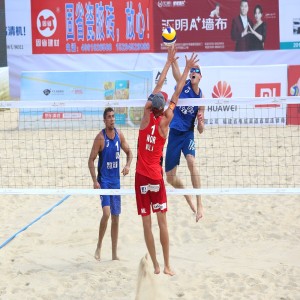
Wednesday Jun 12, 2019
Tri Bourne is back on the road again
Wednesday Jun 12, 2019
Wednesday Jun 12, 2019
It seems an idyllic existence, to be a professional beach volleyball player. Travel the world. Explore the planet’s most breathtaking beaches. See everything there is to see, both inland and coastal. Play in front of thousands of adoring fans. Sign autographs. Take pictures.
Live the life Instagram would love you to have.
That’s all true, yes. Tri Bourne gets to travel the world. He gets to explore the planet’s most breathtaking beaches, eat all the world’s best and unique foods. He gets to see everything there is to see.
Including 2 a.m. in Jinjiang, China. A world away from his family, his pregnant wife, running on two hours of sleep per night for the previous few nights, having just spent the previous 45 hours on planes and buses and shuttles, crammed into spaces not made for abnormally large men who need to use their bodies to make a living. That, and Bourne’s body has been notoriously rebellious these past two years, with an autoimmune disease that has made traveling the world to play a sport with exceptionally high demands on the body that much more stressful.
Most don’t recognize that side of the sport.
Bourne, back full-time on the world tour for the first time since 2016, is again feeling its effects.
“I was up at 2 multiple times,” he said of his time at the Jinjiang four-star, where he and Trevor Crabb finished fourth. “Dude, just freaking lay there. It’s brutal. We kept losing time. We kept going the same direction without going back, so we were going around the world and you had to adjust. So when we got used to it being 7 a.m., we had to adjust.”
Adjusting is the name of the game for professional beach volleyball players. As Kerri Walsh Jennings said from Ostrava, the tournament following Jinjiang – where her and Brooke Sweat claimed their first gold medal as a team – “jet lag doesn’t discriminate.”
Then she was off to the sauna to sweat out some of that jet lag. Which brings up the next aspect of life on the world tour: Staying fit and healthy, maintaining those lean bodies seen on livestreams and TV, is not the easiest of tasks. Hardly.
“It’s difficult,” Bourne said. “A lot of times, we’re using our matches to get us into shape. These tournaments where we’re going seven matches in, you have two days of travel and then you need to recover from that travel, then you have a day or two before you play, so you don’t really have any time.
“Our lifts were super jet lagged. We were just trying to open the body up because everything is super locked up from the plane. And when you haven’t gotten great sleep, you’re sore, you don’t want to push it, because that’s how you hurt yourself. There’s really not much lifting or practicing.”
So they play. They play in Brazil and China and Czech and, hey, last week they even had the chance to play in the United States, for AVP New York! It wasn’t home, necessarily, but it was as close as it gets for life on the world tour. Everyone speaks English. The food is familiar. There’s family. Gyms.
And now, after a quick stay, Bourne and the rest of the U.S. Olympic hopefuls are back on the road, to Warsaw, Poland. Some had to play a country quota, hardly a day to prepare for the cut-throat nature of the single-elimination format. Others will be in the qualifier.
Everyone will be fighting the same, tired, thrilling, exhausted, rewarding, wonderful battle.
“You watch some video, you’re playing,” Bourne said, “then you’re back to preparation.”
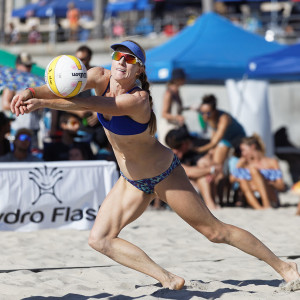
Wednesday Jun 05, 2019
Kim DiCello: The art, and love, of being a good teammate
Wednesday Jun 05, 2019
Wednesday Jun 05, 2019
Kim DiCello was never a bad teammate, same as she has never been a bad co-worker, a bad wife, a bad anything, really. But she did have her moments where “I was this intense, fierce competitor,” she said on SANDCAST: Beach Volleyball with Tri Bourne and Travis Mewhirter. “Not angry, but a little feisty. Without meaning to, I probably gave a couple stare-downs here and there, just having that fierceness, that edge.”
She didn’t think it would change when her son, Luca, would be born. She’d still be the same person. Same interests. Same passions. Same competitive, feisty spirit.
“After having the baby, oh my gosh, this flipped,” she said. “All of a sudden I have this softness, this sweetness, this tenderness that I had no idea was in me. I don’t think anything else could have pulled it out other than having a baby. All of a sudden there’s this gentleness, this patience, this calmness.
“I firmly believe those qualities make me a better person and in being a better person I can leverage those to being a better teammate and an athlete and competing at a higher level. I think it’s going to require reworking and figuring out how these pieces all work together now.”
The timing of DiCello’s words couldn’t be better. Her focus on being a teammate, in a sport that is often viewed as an individual pursuit, seems an anachronism. The women’s side, after just two AVP tournaments this season, has been shaken up and shuffled and thrown into a blender, spitting out dozens of new teams, products of former ones that weren’t entirely unsuccessful but left something to be desired. DiCello was one of them, having split, not by choice, with Katie Spieler after two finishes.
Which isn’t to say that all of those breakups didn’t have their fair and justifiable reasons. Spieler, for instance, is going to Brittany Howard, a close friend and roommate, who became available after a split with Kelly Reeves, with whom she played for a year and a half. Howard, at 24 and still relatively new to the beach game, has all the upside in the world. It’s easy to see the logic behind Spieler’s move, just as it’s typically easier to see the logic behind any partnership move.
DiCello just thinks that sometimes these moves come too quick, that beach is a world of instant gratification rather than longterm gains in terms of partnerships.
“I really love the team dynamic in our sport,” DiCello said. “The value I get out of the experience of being on a team is so great, and it can be frustrating and challenging but I welcome those frustrations and challenges because through them you develop these really strong connections with the people you compete with. And I’m still really close with Lane [Carico] and Emily [Stockman] and Kendra [Van Zwieten], the partners I’ve competed with the last few years.
“It’s a relationship that’s different from the relationships you’ll have with anyone else because you battle together and you’ve been through those good times and bad times and they’ve seen you at your best and they’ve seen you at your worst.
“I want this in all areas in my life. I want to bring out the best in my husband. I want to bring out the best in my little boy. Doing it on the volleyball court is just another space where I get to do that.”
It’s possible that this mindset is a large reason why DiCello has been able to succeed with such a variety of partners. With Carico, who is also a new mother, she finished 13th but also made four semifinals. With Stockman, she finished 17th but also made a final. With Van Zwieten, she finished ninth and fifth twice but also won her first AVP and made at least the semifinals in seven others.
The lows often precede the highs, so long as you can stick it out long enough to see the final product.
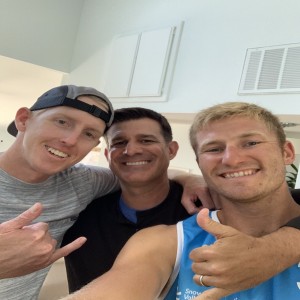
Wednesday May 29, 2019
Chris Geeter McGee: The Art of the introduction
Wednesday May 29, 2019
Wednesday May 29, 2019
Chris Geeter McGee isn’t technically involved in the sport of beach volleyball anymore. He’s passed on his metaphorical emceeing torch to Mark Schuermann. But he’s still a South Bay guy, still plays in all the four-man tournaments, still watches the livestream and keeps up with the sport he’s still fully, unquestionably enamored with. So when there was a NORCECA qualifier this past spring, after the Los Angeles Lakers, for whom he does a variety of media work, were knocked out of the playoff hunt, Geeter went to check it out, see the play and some of the players he still has relationships with.
At the Manhattan Pier that day was Billy Kolinske, whom Geeter kinda sorta knew in the way that those in beach volleyball kinda sorta know everyone, even if they haven’t officially met.
“He said ‘I watched in Chicago. You were a big part of why I wanted to play,’” Geeter recalled. “‘If I ever make a final, I need you to do an introduction.’”
The legend of the Geeter introduction lives on.
A bar in Louisville. Just a small, eight-team tournament. This is the first chapter of the genesis story of the indelible Geeter introduction.
“I was sucking beers down, raging,” Geeter said on SANDCAST: Beach Volleyball with Tri Bourne and Travis Mewhirter. “And they were like ‘Go down!’ So I go down. My whole thing was that I’d break dance but I went down, I was doing these intros, and I was just screaming in [Larry Witt’s] face. Screaming in his face. At a bar in Louisville. And then it was just ‘You’re doing that every time.’”
To say that he did that every time would be such an understatement it would be an insult to the wild and unprecedented creativity that Geeter brought to the sport of beach volleyball. Suck down beers and yell a few intros? Ha! That wouldn’t be it. No, sir.
Geeter ziplined into a Manhattan Beach Open final. Nevermind that he didn’t know how to do it, or what he was doing, dammit he was going to zipline into a Manhattan Beach Open final! With a van filming from the next lane over, he went 80 on a Harley down the highway and straight onto stadium court.
“I’ve never been on a Harley before, I’m losing my shit,” Geeter said. Driving that Harley was “a big lady. A Harley lady. Well, she was a woman. She was on the Harley and she said ‘Hold onto these handle bars.’ That was part of the TV intro.”
One doesn’t write that script. They invent it as they go. Which is exactly what Geeter did in his iconic epoch with the AVP: He invented everything as he went. Given the keys to run the Dig Show, he put his wide spectrum of creative ideas to full use. Hiking in Hawai’i, barbeques, “doing all kinds of stuff,” Geeter said.
And it wasn’t just a gimmick. It was real entertainment with a splash of bona fide journalism, a combination that earned five local Emmy nominations.
“I’m 0-5,” Geeter said, laughing.
It is funny, though, what preceded all that charm and pizzazz and charisma and panache: pure, unadulterated panic. The first time he was given the microphone, in 1998 or 1999, to do an introduction, he handed it back. And then it got handed right back to him. Whether he liked it or not, Geeter was doing introductions.
“I would just start talking, so my intros started to evolve, and then it became part of the show. I’m on the sand, I’m getting people going, and then I’m just learning, so I would just try to get you. How do I get you? How do I get you?” Geeter said. “And then the women said you gotta give us that, so I had to get them going. I always wanted to make sure I gave everything I had.”
His genuinely close relationships with the players not only made it easier to do them as well as he did, but more authentic. He’d throw in inside jokes that only a few people in a crowd of thousands would understand, but that was part of the beauty of it all: The introductions weren’t for the fans, they were for the players. He’d make up random stats on Todd Rogers digs just to get a chuckle out of Phil Dalhausser. The fans wouldn’t know the difference, but a laugh from the Thin Beast is worth more than an uproar from a sold-out Sunday stadium.
“I was a small part of it,” Geeter said. “I needed them. I helped facilitate everything, but it’s not like I was just running the show. The volleyball carried it. I just wanted to make it special. I wanted them to want to be there.”
That goal has been well accomplished. Players who never had the opportunity to hear a Geeter intro – like Kolinske -- nostalgically seek them out. Even those outside of the beach world do, to the point that he is not infrequently requested to do wedding introductions – and then officiate those same weddings. He’s now officiated 17 weddings.
His daughter sometimes asks him why he isn’t doing beach volleyball anymore. Like her dad, she’s a beach enthusiast, tuning into the Amazon livestream of all the AVPs, keeping up with the players. She doesn’t quite understand that “daddy’s with the Lakers,” Geeter said, laughing, and that working with the Lakers is quite a plush gig. But it’s a gig he fully admits he wouldn’t be as exceptional at had it not been for his fun-filled ride in beach volleyball.
“I had no schooling for that,” he said. “I just learned on the go. I bet on myself. I can talk to you, I can go off the cuff. I learned how to do that from the AVP.”